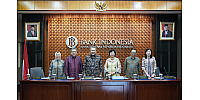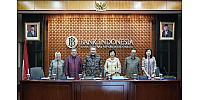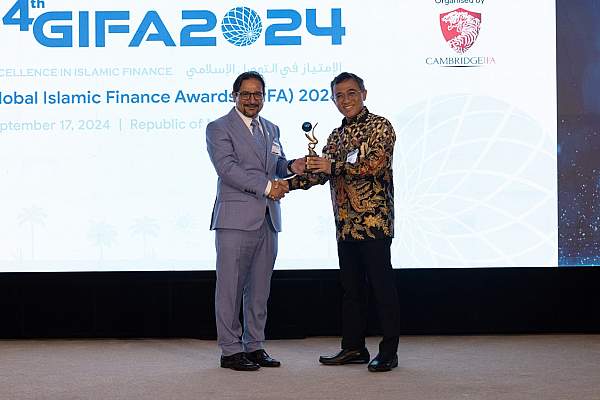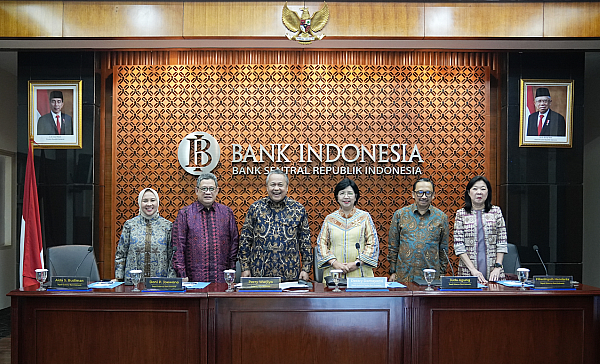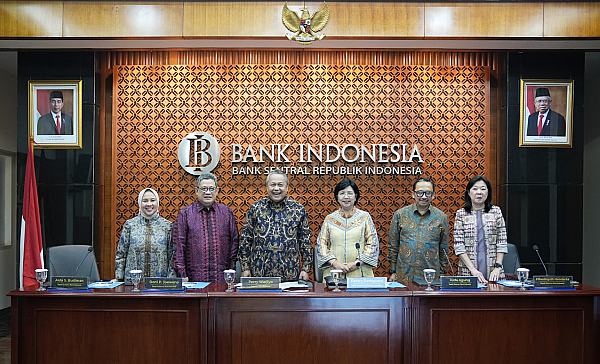August 2024 Manufacturing Industry Performance Declines

The Purchasing Managers' Index (PMI) for Indonesia's manufacturing sector experienced a decline in August 2024, dropping by 0.4 points to 48.9, following a previous reading of 49.3 in July 2024.
The Manufacturing PMI serves as a key indicator for assessing the health of a country's processing industry. This indicator reflects production activity, new orders, and other business conditions within the manufacturing sector.
The calculation of the Manufacturing PMI is based on monthly surveys distributed to purchasing managers across various manufacturing firms. Respondents are asked to evaluate their business conditions across several categories, including production, new orders, logistics, and workforce.
The Manufacturing PMI operates on a scale from 0 to 100. A value above 50 indicates expansion or growth, while a value below 50 signifies contraction or a decrease in activity.
Since May 2024, Indonesia's manufacturing PMI has been on a downward trend, although it remains within the expansion zone. Prior to May 2024, the PMI had consistently indicated expansion for 34 consecutive months (index >50).
In April 2024, the Manufacturing PMI for Indonesia was recorded at 52.9, but it fell to 52.1 in May and further decreased to 50.7 in June, ultimately dropping into the contraction zone in July with a figure of 49.3.
The rating agency Standards and Poors (S&P) Global noted that the growth of Indonesia's manufacturing sector lost momentum in June 2024, attributed to a slower production pace and a decline in new orders and demand.
Contributing factors include a weak domestic market, trade restrictions in other countries, and unfavorable regulations. This situation has affected the optimism of manufacturing industry players regarding future business conditions, leading to a lack of confidence in increasing production levels.
The release from S&P Global indicates that the contraction of Indonesia's manufacturing PMI in August 2024 was attributed to a significant decline in output and new orders, marking the most substantial decrease since August 2021. Additionally, foreign demand experienced a more rapid decline, reaching its lowest point since January 2023.
This drop in sales has led to an increase in finished goods inventory for two consecutive months, causing industry players to hesitate in ramping up production.
Paul Smith, the Director of Economic Research at S&P Global Market Intelligence, noted that companies are responding to the sales downturn by reducing their workforce, although many believe this measure to be temporary.
Respondents remain optimistic about an improvement in economic conditions, which is anticipated to stimulate new demand and enhance production within the next year.
Minister of Industry Agus Gumiwang Kartasasmita expressed that he was not surprised by the deeper contraction in Indonesia's manufacturing sector.
"The decline in the Manufacturing PMI for August 2024 occurred due to the absence of significant policies from relevant ministries or agencies that could enhance the performance of the manufacturing industry," he stated in a written statement from the Ministry of Industry on September 2, 2024.
The Minister also highlighted that the reduction in production and sales within the processing sector has been influenced by the influx of inexpensive imported goods into the Indonesian market since May 2024.
"The abundance of cheap imports has led consumers to prefer imported products for economic reasons. This has adversely affected the sales of similar domestic products and reduced the utilization rate of production machinery," explained Minister Agus.
Febri Hendri Antoni Arif, the spokesperson for the Ministry of Industry, added that government regulations also impact expansion in the processing sector. He cited the government's plan to impose excise taxes on packaged sweetened beverages, which has made industry players more cautious.
The issue of unclear data regarding the 26,415 containers of imported goods at the port, as reported by the Ministry of Finance, has been raised again. These goods have been released into the domestic market for several months now.
As a result, the Ministry of Industry has been unable to formulate policies or measures to address the influx of these imported finished products. "The Coordinating Ministry for Economic Affairs has facilitated meetings among the relevant ministries and agencies, yet clarity on the data remains elusive," he stated.
On the other hand, importers are hastening the importation of finished goods in anticipation of future import restrictions, such as the implementation of Anti-Dumping Duties (ADD), limited bans, and the rerouting of imports for seven commodities to three ports in eastern Indonesia (Sorong, Bitung, and Kupang).
Febri indicated that to promote the expansion of the manufacturing industry, the Ministry of Industry will continue to advocate for the acceleration of the Specific Natural Gas Price (SNGP) expansion, the application of ADD particularly for affected industries such as ceramics and paper, the enforcement of Indonesian National Standards (SNI), and the swift restriction of imported goods along with the enforcement of laws against illegal imports.
"The draft Government Regulation (RPP) on Natural Gas for Domestic Needs must be prioritized for approval, as it could serve as a game changer for the manufacturing industry," Febri remarked.
The government is also urged to continue promoting the use of domestic products among consumers and government sectors. The Indonesian manufacturing industry remains heavily reliant on the domestic market.
For instance, during the 2024 regional elections, it is expected that organizing bodies and candidates will enhance the use of domestic products, particularly those from small and medium-sized enterprises (SMEs) in their activities.
The decline in the Manufacturing Purchasing Managers' Index (PMI) in August 2024 is also reflected in the results of the Industrial Confidence Index (IKI) survey for August 2024, which was released at the end of the month, remaining stagnant at 52.4 (expansion zone).
However, this stability is primarily attributed to the increase in the expansion of new order variables and product inventory variables. In contrast, the production variable has contracted by 2.90 points, resulting in a value of 46.54. This indicates that the company is still depleting its stock to fulfill orders and has not yet increased production.


